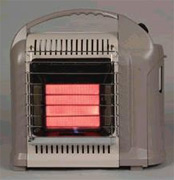This news item expired on Tuesday, January 29, 2013 so the information below could be outdated or incorrect.
Many individuals use a small space heater if their main heating system is inadequate or if just one room of the home is cold. Space heaters have several fuel sources to choose from including electricity, propane, natural gas and kerosene. Their capacity usually ranges between 10,000 Btu to 40,000 Btu per hour.
Convection or Radiant Heat?
 Wondering what the difference between a convection and radiant heat is? Convection heaters circulate the air in a room to raise the temperature. In other words, they heat the entire room.
Wondering what the difference between a convection and radiant heat is? Convection heaters circulate the air in a room to raise the temperature. In other words, they heat the entire room.
Radiant heaters emit infrared radiation that heats up objects and people that are directly in front of it. Radiant heaters are a more efficient choice if you will only be in a room for a few hours and you can remain in front of it. Keep in mind that a radiant heater does not heat the entire room.
Vented and Unvented (Vent-free) Combustion Space Heaters
Unvented combustion units are not recommended for use inside your home. They introduce unwanted combustion products in the living area, including nitrogen oxides, carbon monoxide, and water vapor. Keep in mind that most states have banned unvented kerosene heaters for use in homes and at least five have banned the use of unvented natural gas heaters.
Vented units are designed to have a flue gas vent permanently installed through a ceiling or directly through the wall to the outside. Look for sealed combustion or “100% outdoor air” units, which have a duct to bring outside air into the combustion chamber. Sealed combustion heaters are safer to operate than other types of space heaters and will operate more efficiently because they don’t draw in the heated air from the room and exhaust it outdoors.
Less expensive and less efficient units use the room air for combustion. They do not have a sealed glass front to keep room air away from the fire and should not be confused with a sealed combustion heater.
In addition to the installation and operating instructions from the manufacturer, follow the general safety guidelines for operating any combustion space heater:
-
For liquid-fueled heaters, use only the approved fuel. Never use gasoline. Follow the manufacturer’s fueling instructions. Never fill a heater that is still hot. Do not overfill the heater since you must allow for the expansion of the liquid. Use appropriate containers for the fuel and store fuel outdoors.
-
Have vented space heaters professionally inspected every year. If the heater is not vented properly, not vented at all, or if the vent is blocked, separated, rusted, or corroded, dangerous levels of carbon monoxide can enter the home causing sickness or death. Carbon Monoxide can be produced if the heater is not properly set up and adjusted for the type of gas used and the altitude at which it is installed.
Electric Space Heaters
Electric space heaters are generally more expensive to operate than combustion space heaters, but they are the only unvented space heaters that are safe to operate inside your home. They don’t have the indoor air quality concerns but there are other safety hazards to remember since they can cause burns and fires.
For convection (non-radiant) space heaters, the best types incorporate a heat transfer liquid, such as oil, that is heated by an electric element. The heat transfer fluid provides some heat storage, allowing the heater to cycle less and to provide a more constant heat source.
When buying and installing an electric space heater, you should follow these general guidelines:
-
Electric heaters should be plugged directly into the wall outlet. If you must use an extension cord, use a heavy-duty cord of 14-gauge wire or larger.
-
For portable electric heaters, buy a unit with a tip-over safety switch. The unit will automatically turn off when the heater is tipped over.
Safety
When using a space heater it is important to remember safety. The U.S. Consumer Product Safety Commission estimates that more than 25,000 residential fires every year are associated with the use of space heaters, causing more than 300 deaths.
When buying and installing a small space heater, follow the guidelines below:
-
Only purchase newer model heaters that have all of the current safety features. Make sure the heater has the Underwriter’s Laboratory (UL) label attached to it.
-
To avoid the energy wasted when a room is overheated, choose a thermostatically controlled heater.
-
Use the sizing table provided with the product to determine the proper size for the room. Do not purchase oversized heaters.
-
Place the heater on a level surface away from foot traffic. Extra caution needs to be used to keep children and pets away from a heater.
For additional information on space heaters, contact Buncombe County Cooperative Extension at 255-5522.
Source: U.S. DOE- Energy Efficiency and Renewable Energy